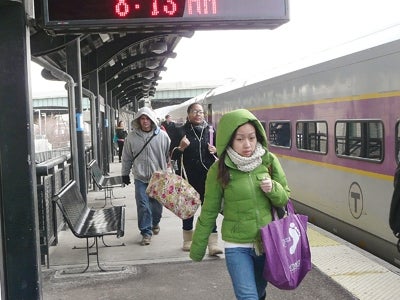Proposed fare hikes and service cuts at the MBTA may not have an effect on Central Massachusetts business now, but they may impact area officials’ efforts to bring Boston-area commuters out here for work and leisure, as well as attempts to make it easier to travel into Boston from here.
Under either of two plans proposed by the MBTA, commuter rail service weekdays after 10 p.m. and all weekend service would be eliminated on all lines.
Mary Ellen Blunt, a program director with the Central Massachusetts Regional Planning Commission, said it would be valuable to have a commuter rail schedule that supported reverse commuting, but commuters from the east “have very, very limited options right now.”
And Mark Bilotta, CEO of the Colleges of Worcester Consortium, noted that the loss of weekend service would “deny the Bostonians the chance to come to Worcester” to take advantage of the area’s tourist attractions.
Slowdown On The Slopes?
One business that would be directly affected is Wachusett Mountain Ski Area in Princeton. Its president, Jeff Crowley said the “ski train” that delivers passengers from the east to the Fitchburg commuter rail station, where they are met by a shuttle bus, typically brings around 150 skiers each weekend day. Losing the T service could mean up to $500,000 in lost revenue for his business, Crowley said.
Crowley added that the weekend train service “helps the whole region,” with tourists coming to enjoy the Johnny Appleseed Trail and other attractions throughout the year.
Crowley’s view was echoed by David McKeehan, president of the North Central Massachusetts Chamber of Commerce. He called the ski train, and commuter rail service in general, “an important part of our local economy.”He added that the $300 million in federal money invested in the Fitchburg line in recent years won’t be able to bear fruit if commuter rail service “doesn’t support a regular work schedule.”
Frustration Over Cuts
Mohammed Khan, administrator of the Montachusett Regional Transit Authority, also expressed frustration with the proposed cuts. “When you’re dealing with a $30 billion budget for the state, is a $161 million deficit for the MBTA worth that kind of a shakeup?” he wondered.
He noted that Devens, with a large Bristol-Myers manufacturing plant, draws commuters from the east, and said he believes there is demand for reverse commuting service all the way out to Fitchburg and Leominster. But, without robust service, “I think we are going to have a ghost town,” he said.
Reverse Commuting
Ed Carr, administrator of the MetroWest Regional Transit Authority, agreed with Khan, but seemed more optimistic that service reductions could be avoided. He called the MBTA proposals “probable, but not inevitable,” and said he hopes the state will find another way to pay for the service.
Carr said he believes commuter rail ridership in his area is growing, and his organization has instituted a bus route between the MBTA’s Woodland station on the Green Line in Newton and the MWRTA’s central hub on Waverly Street in Framingham for the convenience of commuters from the east. The service includes stops at Staples headquarters, Mathworks, Newton-Wellesley Hospital, 9/27 Plaza, Natick Collection and Flutie Pass. “There’s definitely an appetite for reverse commute [service] out here,” he said.
Also in MetroWest, Barbara Clifford of the Corridor Nine Chamber of Commerce expressed bewilderment at the proposed reductions in train service. “You don’t buy [tracks] from CSX and then stop running trains,” she said, adding that “if we want growth and progress and increasing the tax base,” providing easier, more convenient connections between Boston and the rest of the state is vital.
Committed To Worcester
MBTA spokesman Joe Pesaturo responded that, “the commonwealth is committed to increasing weekday service on the Worcester line.” In a speech last week before the Blackstone Valley Chamber of Commerce, Richard Davey, secretary of the state’s transportation department, which oversees the MBTA, reaffirmed that commitment.
Pesaturo added that he has been encouraged by the response at meetings held by the MBTA to inform the public of its proposals and get their ideas and responses. “People realize that this [budget deficit] is not something the T can solve on its own,” he said. He added that elected officials who have come to the meetings “understand the gravity of the situation, and we are providing everything they need to make decisions.”
While no legislative solution could be enacted and implemented before the MBTA has to submit its budget in April, the adoption of a budget by the MBTA won’t be the end of the process, Pesaturo said, “Not by any means.”
Read more
Study to Examine Manufacturing Barriers in North Central Mass.

